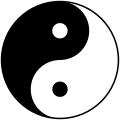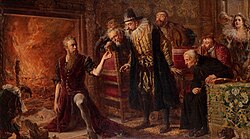Alchemy
Alchemy is the very old study and philosophy of how to change basic substances (such as metals) into other substances. It also studied how substances (and how they are changed into other substances) were related to magic and astrology. People who studied alchemy were called alchemists. Some things alchemists tried to do were change lead or mercury into gold, make the philosopher's stone, and make the "elixir of life," which they thought could cure (make better) any disease and make someone young again.
Alchemists believed that substances, mind, philosophies, religion, magic, and astrology were related to each other. They tried to find connections between them. They tried to understand one by understanding the other. Some alchemists used metals (like gold or silver) to represent spiritual or occult ideas. People in many different countries studied alchemy.
In the 1600s and 1700s, people started to study only the properties of substances without trying to relate them to secret, old knowledge. They did experiments and wrote down what they discovered so other people could learn from them. One of the important people who did these experiments was Robert Boyle. People called the new study of substances chemistry.
Scientists have since discovered how to change one kind of element (the simplest kind of chemical substance) into another. In 1980, an American scientist named Glenn Seaborg discovered how to change a very tiny amount of bismuth into gold with a nuclear reactor.[1] Making gold this way is much more difficult and expensive (costs a lot of money) than mining or recycling it.
Alchemy Media
15th century depiction of an Ouroboros from the alchemical treatise Aurora consurgens (Zurich, Rheinau 172).
15th-century artistic impression of Jabir ibn Hayyan (Geber), Codici Ashburnhamiani 1166, Biblioteca Medicea Laurenziana, Florence
Taoist alchemists often use this alternate version of the taijitu.
The Alchemist in Search of the Philosopher's Stone, by Joseph Wright, 1771
Veiled Christ, a 1753 statue by Giuseppe Sanmartino, was widely believed to be created by alchemy.[source?]
Alchemist Sendivogius (1566–1636) by Jan Matejko, 1867
- Robert Boyle (1627–1691), an Irish-born English scientist, was an early supporter of the scientific method and founder of modern chemistry. Boyle is known for his pioneering experiments on the physical properties of gases, his authorship of the Sceptical Chymist, his role in creating the Royal Society of London, and his philanthropy in the American c
An alchemist, pictured in Charles Mackay's Extraordinary Popular Delusions and the Madness of Crowds
References
- ↑ "Objects and stories". Science Museum.









